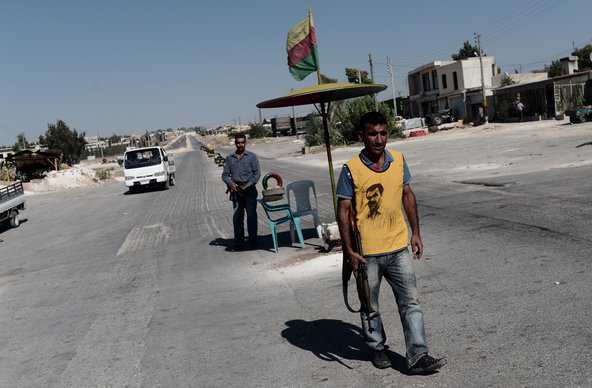
Aris Messinis/Agence France-Presse — Getty Images A portrait of Abdullah Ocalan is diplayed on the t-shirt of a Kurd at the Syria-Turkey border on Aug. 23
LONDON — Turkish intelligence agents have been making the short hop from Istanbul across the Sea of Marmara to the prison Island of Imrali in recent weeks for talks with a jailed Kurdish separatist leader who was once Turkey’s most wanted man.
Abdullah Ocalan, founder of the Kurdistan Workers’ Party, the P.K.K., has been languishing on Imrali since he was captured in Nairobi, Kenya in 1999 while on the run. He is serving a life term after a death sentence was commuted.
Now the Turkish government wants his help to end a resurgent war with P.K.K. rebels that has claimed around 900 lives in the last year and a half.
Recep Tayyip Erdogan, the Turkish prime minister, revealed the dialog last week when he told state-run TRT television, “I cannot hold such meetings myself as a politician but the state has agents and they do.”
In an acknowledgement that the latest escalation in a three-decade battle against the Kurdish insurgents was probably unwinnable, Yalcin Akdogan, a senior adviser to Mr. Erdogan, said that the talks were aimed at persuading the P.K.K. to disarm.
“The government supports any dialog to this end that could result in a halt to violence,” Mr. Akdogan said in a television interview. “You cannot get results and abolish an organization only with armed struggle.”
The strategy of seeking a deal with the P.K.K. has implications for Turkey’s policy in neighboring Syria, as Rendezvous wrote last summer, where Kurdish militants linked to the organization have taken over territory vacated by retreating government forces.
Turkey “fears that an autonomous Kurdish region in Syria would become a haven for Kurdish militants to carry out cross-border attacks in the Kurdish areas in southeastern Turkey,” my colleague Tim Arango recently reported from the border region.
Tensions over Syria and the Kurdish issue have also led to a souring of Turkey’s relations with Iran and the Iraqi government in Baghdad, as Ankara struggled to cope with the aftermath of the so-called Arab Spring.
There is a question mark over how much authority the jailed Mr. Ocalan has over the P.K.K. leadership, which is based in the Qandil mountains in the Kurdish region of northern Iraq. “He remains a figure of symbolic importance,” Mr. Akdogan said of the P.K.K. founder. “But we still have to wait and see how Qandil will react.”
Mr. Ocalan’s capture in 1999 was a cause of national celebration among Turks after the worst years of a war that has cost 40,000 lives, including those of Turkish and Kurdish civilians. The P.K.K. is regarded as a terrorist organization by, among others, the United States and the European Union.
However, the Turkish authorities have not shrunk from dealing with Mr. Ocalan in the past to intervene in Kurdish matters.
In November, he saved the authorities from an escalating crisis that threatened to worsen tensions with the Kurds by calling on hundreds of his imprisoned supporters to halt a two-month hunger strike. The protesters had been demanding an end to Mr. Ocalan’s isolation and improved rights for Turkey’s Kurdish minority, which makes up 20 percent of its population.
Andrew Finkel wrote in the IHT’s Global Views opinion section that the intervention signaled the resumption of Mr. Ocalan’s career.
Mr. Ocalan is now reportedly demanding direct contact with the P.K.K.’s leadership and improved prison conditions as the price for his cooperation in persuading the militants to lay down their arms.
Some observers have cast doubt on the government’s strategy of dealing with Mr. Ocalan while failing to carry out reforms in favor of the country’s Kurdish minority.
David Rohde wrote in Rendezvous at the weekend that more than 10,000 Kurds were imprisoned in Turkey on various terrorism charges.
According to Hugh Pope, project director of the International Crisis Group in Turkey, the government of Mr. Erdogan is putting the cart before the horse. “They need to find a Kurdish settlement first before cutting a deal with the P.K.K.,” he told Rendezvous from Istanbul.
That would include instituting promised reforms that would give equality to Turkey’s Kurdish citizens, including the right to a Kurdish-language education.
“The P.K.K. wants to do a deal and obviously Ocalan is desperate to get out of jail,” Mr. Pope said. “He may be an essential ingredient but he’s not the magic key.”
via To End Kurdish Conflict, Turkey Calls on Archenemy – NYTimes.com.

Leave a Reply